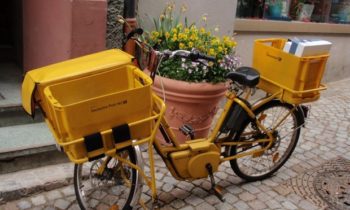 Oslo is so keen to get people on bicycles that starting Wednesday it will offer residents a free handout of up to $1,200 to buy electric cargo bikes. Citizens won’t need to be on a low income to apply for the funds, or even to promise to cut down on driving to qualify.
Oslo is so keen to get people on bicycles that starting Wednesday it will offer residents a free handout of up to $1,200 to buy electric cargo bikes. Citizens won’t need to be on a low income to apply for the funds, or even to promise to cut down on driving to qualify.
The grant, which goes toward buying a bike with a small electric motor that allows it to carry heavier loads in a basket or trailer, may sound too good to be true, but it isn’t a total free-for-all. The city will pay up to 25 percent of the bike’s cost, capping the grant at 10,000 kroner. Electric cargo bikes currently cost between 20,000 and 50,000 kroner ($2,400 to $6,000), meaning that buyers will still have to rustle up between $1,800 and $4,800 from their own funds. That’s a lot of free municipal money for a pretty niche mode of transport.
So why is Norway’s capital putting its money behind cargo bikes? Because Oslo needs to push for a further shift away from cars if its air is going to be breathable. Like many European cities, Oslo’s air quality has been pretty poor so far this winter, leading the city to put a temporary driving ban on diesel-fuelled vehicles in order to help clear the atmosphere.
In a bid to push a general modal shift away from cars, the country is investing a phenomenal $1 billion in new bike infrastructure, so the paths that Oslo’s future cargo bikes use should ultimately be of high quality. But there are still some hurdles. Oslo, for example, is considerably hillier than, say, Amsterdam or Copenhagen, and it can experience some harsh weather conditions. For that reason electric cargo bikes are a potentially greater part of the solution here. Not only do they give riders a push up hills, they also make bikes a feasible option for new purposes like weekly grocery shopping. They can even be used for the school commute: In Copenhagen, it’s already common to see parents pedaling several small children to school in a cart attached to their bike.
Five million kroner ($600,000) is earmarked for the project—3 million for private individuals and 2 million for businesses and organizations—meaning the program can only bring 500 to 1,000 electric cargo bikes onto Oslo’s streets. That’s not going to transform the way people get around overnight, but it’s not supposed to on its own. The intention is to popularize a currently underexposed form of transit, which more people may adopt if they see it in action and register its advantages.
It’s a concept Oslo’s city council seems fond of. It created a similar scheme last winter that offered up to 5,000 kroner ($600) to encourage people to buy standard e-bikes, capping the amount offered at a slightly more modest 20 percent of the purchase price. The council seems to have been happy enough with the results to extend the scheme into new territory.
Not everyone is convinced, though. It emerged recently that some of Oslo’s richest citizens had successfully applied for the e-bike grant, leading some people to condemn it as a subsidy for the wealthy. Newspaper Dagbladet memorably damned the plan as “the dumbest thing since scrambled eggs in a carton,” and reported unsubstantiated rumors that people from elsewhere in Norway were applying for the bike subsidy using Oslo-based relatives.
There’s some validity to this pushback. Even with a grant on offer, poorer Osloers aren’t the ones who will be shelling out the rest of the money for an electric cargo bike, and there might be cheaper ways for the city to reduce emissions. Reporting from outside Norway—a country now famous for saving enough from oil revenues to make every citizen a kroner millionaire—what is more striking is the singularly large funds the country is making available for pursuing better transit at just about every level. This is, after all, a country considering the construction of the world’s first floating underwater tunnels to bridge its fjords, where electric cars outsell conventional vehicles, and whose aforementioned $1 billion funding for bike infrastructure includes cash for bike paths comfortably north of the Arctic Circle. Oslo’s e-bike subsidies may have an edge of luxury to them, but they’re also the sign of a city and a country that is singularly determined to make its transit cleaner and greener.
(citylab)
